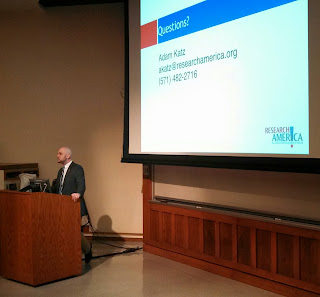Recap: Adam Katz of Research!America- How (and why) to engage Congress as a research scientist

Adam is the Policy and Advocacy Specialist at Research!America, where he leads a variety of advocacy initiatives to make science and medical research a higher national priority. When he visited PSPG on Nov. 12th he spoke about how and why scientists, especially those in academia, should engage in the political system. Academic scientists in particular are heavily supported by federal funding and taxpayers, so it is important to initiate and maintain a dialog between researchers, politicians and the American people. Research!America has conducted numerous polls to understand the relationship between these three groups, and they have found that while Americans believe scientific research should be a top priority, the public does not have a clear understanding of how this research is funded (only a small fraction of those polled identified the NIH as the main source of basic biomedical research funding). Therefore it is important that we as scientists, taxpayers and constituents take it